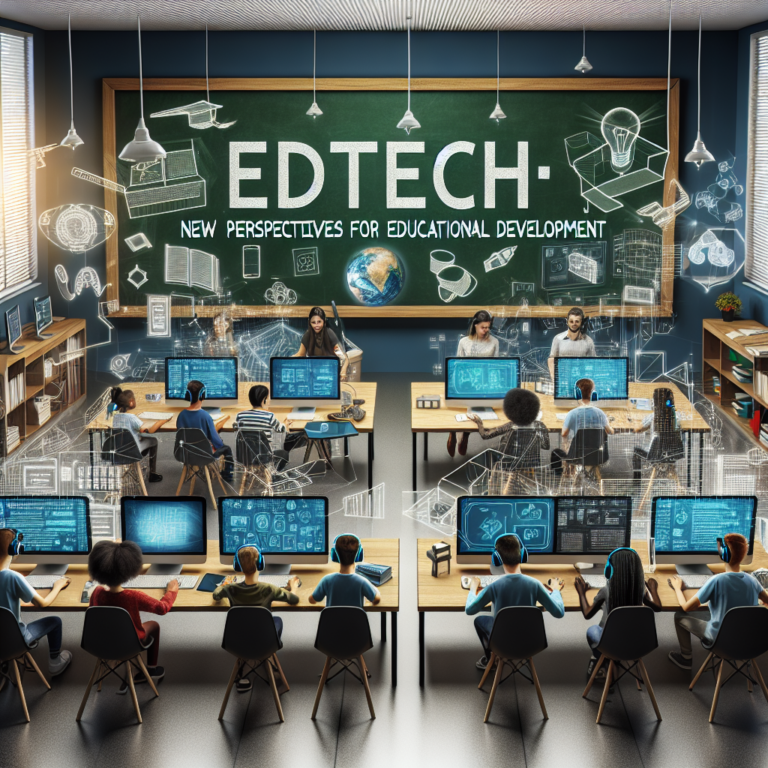The Role of EdTech in Educational Inclusion in Mexico
Introduction:
Education plays a pivotal role in societal development and economic progress, making it crucial for every individual to have equal access to quality education. However, ensuring educational inclusion, particularly in developing countries like Mexico, can be challenging due to various socio-economic factors. In recent years, educational technology, or edtech, has emerged as a potential solution to bridge this gap and promote inclusion in the Mexican education system. This article explores the significance of edtech in facilitating educational inclusion in Mexico and its potential to revolutionize the country’s education landscape.
Hook:
Imagine a world where geography, socioeconomic background, and physical limitations do not limit a child’s access to quality education. This is the power of edtech – an innovative approach that could reshape the educational landscape of Mexico, breaking down barriers and ensuring educational inclusion for all.
The Significance of EdTech in Educational Inclusion:
1. Access to Quality Education: Edtech provides an opportunity to overcome geographical barriers by enabling students in remote areas to access quality education resources. Through digital platforms, students can access online classes, educational videos, and interactive learning materials that were previously inaccessible. This not only broadens their knowledge but also enhances their skills, preparing them for a better future.
2. Personalized Learning: Traditional classroom settings often struggle to cater to the diverse needs of students. Edtech offers personalized learning experiences that adapt to each student’s learning pace and style, promoting individual progress. By using data analytics and artificial intelligence, edtech platforms can create tailored learning paths, helping students with different abilities and learning challenges to thrive in their education.
3. Inclusivity for Students with Disabilities: One of the major challenges in achieving educational inclusion is catering to students with disabilities. Edtech provides innovative solutions like audiobooks, text-to-speech software, and adaptive learning technologies that accommodate various disabilities. With the help of these tools, students with visual or hearing impairments, physical disabilities, or learning disorders can actively participate in the learning process, thus empowering them to achieve their full potential.
4. Parental Engagement and Support: Edtech encourages greater parental involvement in their children’s education. Parents can easily track their child’s progress, access learning materials, and communicate with teachers through online platforms. This involvement empowers parents to actively support their children’s education journey, thereby fostering a stronger parent-school partnership.
5. Bridging the Socio-Economic Gap: Edtech has the potential to bridge the socio-economic gap by providing equal access to educational resources. By democratizing education, edtech platforms cater to students from all backgrounds, regardless of their financial constraints or social status. This equal opportunity minimizes educational disparities, promoting a more inclusive society.
FAQs:
Q1. What are some prominent edtech platforms in Mexico?
A1. Some popular edtech platforms in Mexico include Aprende.org, Educaline, Wingu, and Nubeuniversitaria, among others. These platforms offer a range of educational resources, from K-12 learning materials to university-level courses.
Q2. Is edtech only limited to online learning?
A2. While online learning is a significant aspect of edtech, it encompasses a much broader scope. Edtech includes digital tools, applications, software, and hardware that facilitate learning and enhance educational outcomes. It can be used in both online and offline settings, making education more accessible to all.
Q3. What challenges does edtech face in promoting educational inclusion in Mexico?
A3. Despite its potential, edtech faces several challenges, including the digital divide, lack of internet access in remote areas, limited technology infrastructure in schools, and resistance to change from traditional educational institutions. Overcoming these challenges requires collaboration between government, educational institutions, and the private sector to ensure widespread implementation and maximize its impact.
Conclusion:
Edtech holds immense promise in promoting educational inclusion in Mexico. By leveraging technology to provide equal opportunities, personalized learning experiences, and innovative solutions for diverse student needs, edtech can transform the educational landscape of the country. Embracing this powerful tool is not only crucial for Mexico’s socioeconomic development but also for empowering all individuals to reach their full potential through quality education.


















